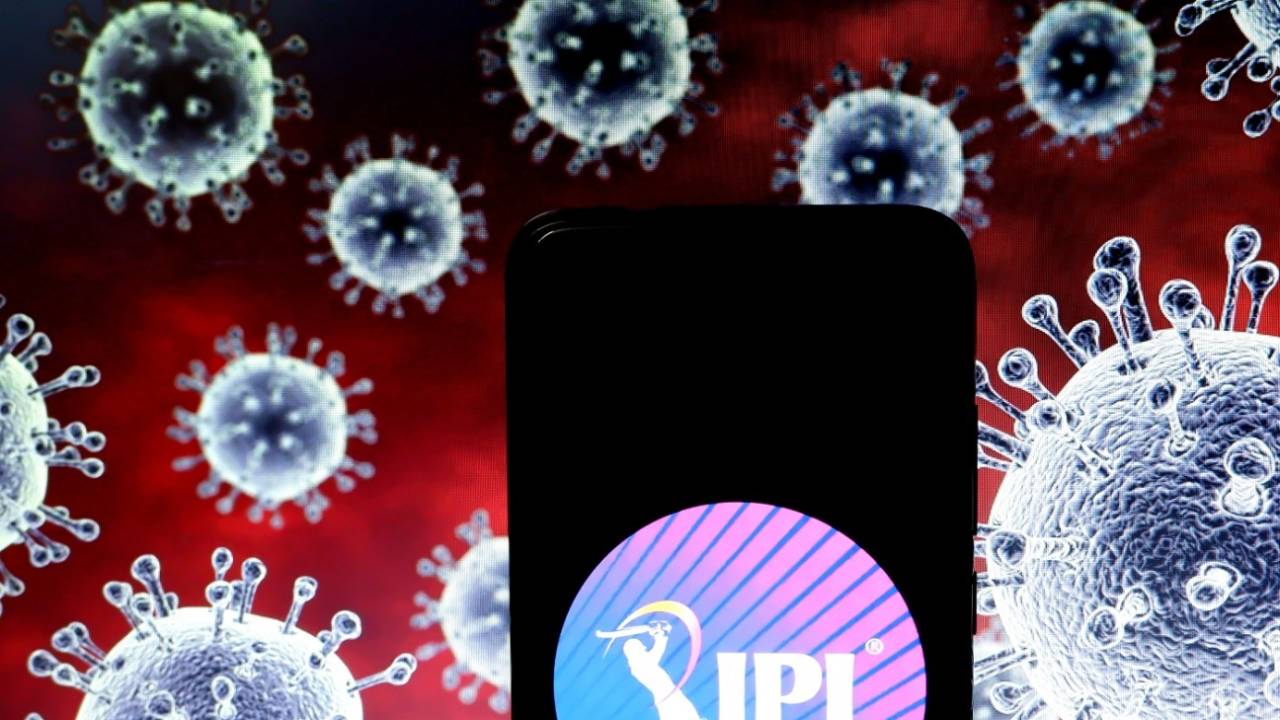On Sunday afternoon, as the captains of Chennai Super Kings and Royal Challengers Bangalore
waited for the toss, the commentator Ian Bishop put out this public service announcement: mask up, keep a safe distance, self-sanitise. The simple message, repeated several times during play, was the first high-visibility sign of the IPL as an institution addressing the resurgence of the Covid-19 pandemic that has wreaked havoc in India.
There have been occasional statements by commentators and some franchises on similar lines - mask up, stay safe - and some individual players have gone further. But this was the first time the IPL used the high-profile toss segment of its broadcast to spread this message, the recognition that outside the bio-bubble was a country fighting a desperate battle against the pandemic.
India is currently in the grip of an especially vicious wave of the Covid-19 pandemic. Countrywide, there are 300,000 new cases every day - the most by any nation since the pandemic first broke out last year - and the effect has crippled healthcare and allied services, even in Delhi, the national capital. Just for context, there have been 26,000 deaths since the IPL began on April 9.
The IPL's tepid response till very recently has prompted the perception that it is a bubble within the bubble - that the entire system is cut off from the world outside to the extent almost of tone-deafness. This cannot be the reality, of course, because the players are in virtual contact with life outside and have had family and acquaintances affected by the virus. But it is the perception, helped by the silence emanating from the tournament itself.
Indeed, it has led to a line of thinking that the IPL should be called off. That in a time of national tragedy as this is - and a tragedy that, by all estimates, will get worse before it gets better - sport is irrelevant, perhaps even disrespectful. This is not a time for light entertainment.
That is debatable, because there are clearly takers for the IPL as entertainment or distraction from the surrounding grimness. Anecdotal evidence, perhaps, but I can hear the TV commentary from apartments around mine every evening, and I know of people - including one 80-year-old aunt - who wait for that match every day to offer some relief.
Equally important, though, is to see the IPL as not merely a sporting activity, 22 men playing cricket under floodlights. It is an economic activity that brings in millions of dollars, which are then spread around the wider cricketing ecosystem and to the country at large. Think of hotel rooms occupied, chartered flights booked and the IPL gig economy - social-media teams, cameramen, commentators, security and catering and housekeeping staff, and all the people they support in turn - that keeps the wheels turning. A distressed economy needs whatever cylinders that can keep firing.
Crucially, it is a well-managed bubble, as it was in the UAE last year; two weeks in, there have been positive cases, but largely before the tournament started. The lack of crowds and the caravan concept - two venues at a time, instead of teams criss-crossing through the tournament - make it easier to manage logistics.
It is precisely this immense soft power, though, that the IPL needs to wield at this moment.
There have been individual, perhaps oblique, statements. Royal Challengers Bangalore have a short public-service video about basic bio-safety protocols; on Saturday, Delhi Capitals released a message about plasma donation in the Covid-19 context. R Ashwin, who plays for them, has also been tweeting about plasma availability. Harbhajan Singh hasn't merely expressed his anguish - he has helped set up a mobile testing lab in Pune and has retweeted some of the thousands of cries for help on social media, hoping his influence can open doors.
Even Shoaib Akhtar - the Pakistani bowler Indian fans loved to hate - issued a simple, heartfelt appeal for help.
There is plenty more that the IPL can do even now - sponsor the distribution of N95 masks or sanitisers; setting up vaccine camps or announcing that some percentage of their income will go to a specified fund. And, easiest of all, using the big names - especially those on its payroll - to reinforce the same simple message.
Abhinav Bindra, the only Indian to win an individual Olympic gold and now part of various high-level athletes' commissions, spoke about this issue on Sunday. Writing in The Indian Express, he said the players should acknowledge the enormous privilege they enjoy to be able to play sport in these times. If he was BCCI president, he said, and "had the capability", he would "give a large amount to do, say, the vaccination right or help out in any other way. This is one way to acknowledge that to conduct the IPL right now is a huge privilege and everyone should act responsibly."
The BCCI is famous for its ability to think on its feet, to change or create or tweak plans to suit the situation. It has responded with alacrity to many crises in the past, usually when cricket is under threat. This threat is far greater and more serious - it's a country in crisis.
Jayaditya Gupta is executive editor of ESPNcricinfo in India

